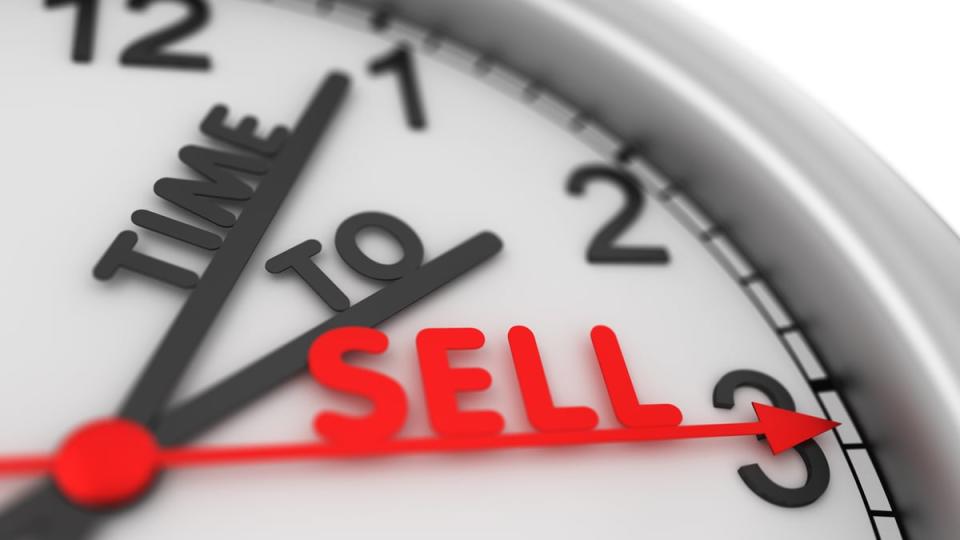Worried About a Market Sell-Off? 3 Valuable Pieces of Advice.
The S&P 500 and Nasdaq Composite Index got off to a fantastic start this year. Through mid-July, both widely followed indexes were up around 20%. In the past month or so, they have taken a bit of a breather, although both have bounced back slightly.
Dips like this can certainly be concerning for even the most seasoned investor. If you're worried about another market sell-off, here are three valuable pieces of advice. They should help reset your perspective and get you back on track to achieving your long-term investing goals.
1. Sell-offs are par for the course
The stock market is one of the best arenas the average person has for building lasting wealth. Historically, the S&P 500 has produced an average annual return of 10%, which means you would double your money about every seven years. That's a wonderful outcome.
But it's never a smooth ride. Volatility is something all investors must deal with if they want to make money over the long term -- the mood of market participants is always changing.
I'm paraphrasing somewhat here, but Giverny Capital, a Canadian investment manager, has a general rule of thumb. It states that once every three years, expect the market to experience a 10% drawdown.
There have been many dips in recent years, all for various reasons. Whether it was the pandemic in 2020, rapidly rising interest rates in 2022, or a rotation out of tech stocks in 2024, negative headlines will always pop up occasionally.
Understanding that sell-offs are a normal occurrence can help you remain calm whenever they happen.

2. Don't panic
When you see red ink on your brokerage account, it can be hard to stomach. Our instincts might kick in and force us to panic. Consequently, we might end up selling our holdings to avoid any further losses.
This is a huge mistake. To be clear, trying to successfully time the market's ups and downs is a losing proposition. No one can accurately do this consistently, no matter how smart the idea sounds.
In fact, you're likely causing more harm to your portfolio. According to data from JPMorgan Asset Management, if you missed the S&P 500's 10 best trading days during the 20-year period that finished at the end of 2023, your annual return of 5.5% would be meaningfully lower than the 9.7% gain had you simply held on and stayed the course.
Making things even more difficult is that the market's best days often follow its worst days. Jumping in and out of stocks is not the right move. At the end of the day, time in the market matters most. Reject the urge to quickly dump your holdings out of fear.
3. Consider being a buyer
"Be fearful when others are greedy and greedy when others are fearful," the great Warren Buffett is famous for saying. Part of what he means is that market corrections, while typically full of worry, are actually the best times to put money to work and buy stocks.
You already understand that sell-offs are normal. And you've decided that you won't panic and sell your positions. The next step is to consider if you should buy stocks.
If you have cash lying around, after setting up an emergency fund and paying off all high-interest debt, then use the dip to play offense and allocate more capital. The market has historically gone up over extended periods.
Next time the market has a period of weakness, remember these three pieces of advice.
Don’t miss this second chance at a potentially lucrative opportunity
Ever feel like you missed the boat in buying the most successful stocks? Then you’ll want to hear this.
On rare occasions, our expert team of analysts issues a “Double Down” stock recommendation for companies that they think are about to pop. If you’re worried you’ve already missed your chance to invest, now is the best time to buy before it’s too late. And the numbers speak for themselves:
Amazon: if you invested $1,000 when we doubled down in 2010, you’d have $19,941!*
Apple: if you invested $1,000 when we doubled down in 2008, you’d have $42,763!*
Netflix: if you invested $1,000 when we doubled down in 2004, you’d have $363,520!*
Right now, we’re issuing “Double Down” alerts for three incredible companies, and there may not be another chance like this anytime soon.
*Stock Advisor returns as of August 12, 2024
JPMorgan Chase is an advertising partner of The Ascent, a Motley Fool company. Neil Patel and his clients have no position in any of the stocks mentioned. The Motley Fool has positions in and recommends JPMorgan Chase. The Motley Fool has a disclosure policy.
Worried About a Market Sell-Off? 3 Valuable Pieces of Advice. was originally published by The Motley Fool
